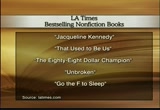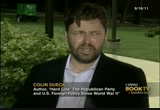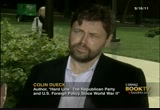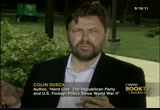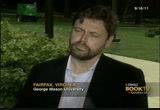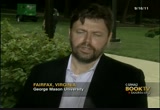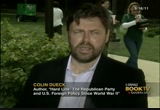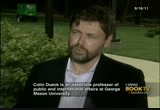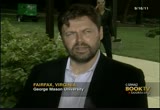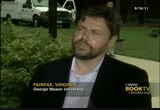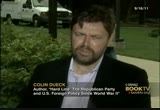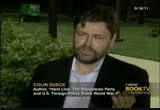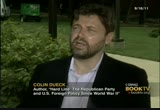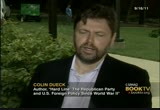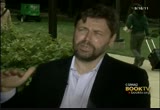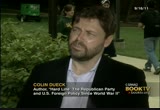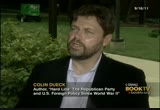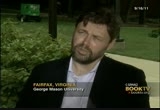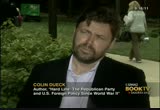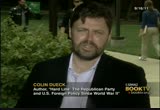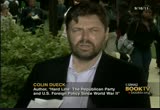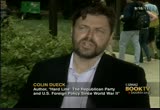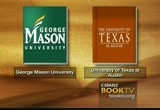tv Book TV CSPAN October 10, 2011 1:35am-2:00am EDT
1:35 am
why isn't it a black person teaching and when we get to that point in the country it will be great did you should say okay this is where we should be treated don't just asked why the teacher isn't black. >> what is the racial makeup of your case to the ku klux klan x >> i would say at least half the students of color and usually at least one-third of the students are international students. i often have students from africa or come from africa. so that's another thing i enjoy about teaching at neeson as we have a very diverse student audience into they bring their perspective into the classroom. >> suzanne smith professor george mason university and author of this book to serve the living funeral directors and the african american way of death published by harvard.
1:37 am
now an interview from george mason university. >> professor of public and international affairs said george mason university and also the author of this book hard-line the republican party and u.s. foreign policy since world war ii. professor speed, what is hard line to you? >> it's a title because the sums up one of the main arguments in the book is that the republican party has had a foreign policy approach that tends to be hard lined by which i mean the foreign policy to increase syria's lead the way that there are threats out there and now to
1:38 am
the united states trying to be uncompromising in the face of those threats. that is consistent but there's also been a variety in what particular republican comes under what particular president is to make the was my next question. 67 years since the end of world war ii. there are what 67, 34 years 34 of those have had republican presidents. is there any consistency? >> amine consistency is the one i just described under the republican presence there hasn't been an isolationist president a tendency to when the hard-line approach that's been consistent. the variety has been somebody like what's a boesh xli and bush 43, jr. and two of them each with richard nixon and ronald reagan as well.
1:39 am
>> roudebush's different from ronald reagan, etc.? >> the emphasis was on stability, prudence and caution he was trying to preside over the dramatic changes in the u.s. national interest which it is successful. bush 43 after mine alone and was convinced of an approach would that was much more idealistic the u.s. would try to undercut support for terrorism by winning iraq democratizing the middle east country different. >> in your book you have checkers as well on barry goldwater and robert. >> i choose the because their senators who are good indicators of the public opinion at crucial moments of course was the nominee for president, 64 he ran and he represents an era in the
1:40 am
30's and 40's where midwestern republicans were antiinterventionist and one of the stories in the book is how the eventually did in the end of that tradition and you had the success of eisenhower and the republicans but it took a long times and in some ways if you think about somebody like ron hall he's in a tradition i choose goldwater because he was an important figure of the republican party to become more conservative, more western and more hawkish on foreign policy sleaze and though he lost the presidential election and he pointed the way toward other nominees like reagan and bush 43. >> robert taft for and for president why? one, twice cracks >> he ran 48, 52, yes.
1:41 am
>> was he not be elected because of the isolationist policy? >> that is one of the reasons. i think especially for more moderate republicans the sort of establishment in the northeast also by that time he was criticizing truman for not being tough enough so one of the stories is the 52 he actually it's the staunch anticommunism but wins him over the cold war policy what we had is more of a series of difficulties in some ways the disagreed how much of the land they should have in europe for example but there was a hard line. islamic you begin your work at the end of world war ii. is this a reaction, public reaction to the fdr presidency? >> guest: republicans are definitely inclined to oppose
1:42 am
the fbi in many cases including the foreign policy because they opposed to so bitterly that was part of its. both parties back and forth and the associated fdr's new deal with the liberalism that went out during the war so some of the war conservatives were skeptical that the idea of the u.s. should play a role through multilateral organizations after world war ii. >> professor, when you hear the phrase parts and politics stops at the water's edge what do you think? >> it doesn't. in a couple census first of all democrats and republicans of genuine differences on how america should be involved in the world, so there is a principal disagreement and they show up in partisan politics. both parties use foreign policy is sometimes as a kind of
1:43 am
political instrument to critique the riverside. it's just one more element of the partisan politics sometimes regardless of the president is saying you see that as well. >> ronald reagan won the cold war. >> i think ronald reagan played a vital part in winning the cold war the way that he didn't was to ramp up pressure across the board when he took over in 1981 the military economically who, ideologically and that is one of the sectors that forced the soviet union to rethink the approach >> did it change foreign policy? >> americans had to decide where do we go next what should the role in the world be and so for the republicans especially it had been a unifying force and
1:44 am
left republicans sort of confused and divided and there was a wing in the 1890's there was the more it realist henry kissinger type of fought and nationalists who believed the strength skeptical of the humanitarian intervention and i think george w. bush ended those disagreements for a while through the concept of the war and tear of the history surfacing today. >> professor speed, when lyndon johnson was president or jimmy carter was president was there a vast change in american foreign policy? >> writing that carter tried to bring it about because he was the only cold war president who believed you could get beyond the cold war unilaterally you could declare an end to it unilaterally. he would emphasize issues like human rights and north's health
1:45 am
issues and try to move beyond what he called the heat of communism it turned out the soviet union said it differently in the cold war still continuing, so it was difficult to declare an end and by the end of his presidency he was one but to the cold war position. lyndon johnson you mentioned and he is best known for the viet nam and his foreign policy but most republicans at the time people were firm on the idea that johnson should fight the vietnam and goldwater criticized for not enough communism in vietnam so that was the position during the johnson years was a funny thing to be more aggressive against north vietnam. >> who makes foreign policy and creates foreign policy? is a the intellectuals? scholastic types or is it presidents? >> it's presidents. that's what i found.
1:46 am
the influence is overrated. probably the best example in the recent years is a lot being sold on the subject and really i think if you look and bush years it was president bush that made the key decisions with her to invade iraq, how to invade iraq and follow-up the actions we iran. sometimes he didn't increase concerns people didn't like sciu had intellectuals influential but they were not making policy and they were as influential as it gets so foreign policy isn't made by intellectuals. >> what is neoconservatives on? >> the word is usually used to mean the republican foreign policy approach which is particularly kokesh the u.s. should promote democracy even the world even by force is
1:47 am
necessary. this is something where there are routes in the broader american tradition so if the word sometimes overused. the concept of the new conservatism has a lot of broad republican and american traditions. most americans are pretty kokesh on the policy it gets right down to so to say that it was just the neoconservatives that somehow pushed george bush into iraq is not accurate. >> colin dueck your bouck card line republican party in u.s. foreign policy since world war ii published by princeton your chapter on richard nixon is entitled richard nixon and henry kissinger to read >> royte because henry kissinger was just an exceptionally important figure. we will only include a handful of people that were not and nixon and kissinger were a team. at the end of the day he made the decision and kissinger said
1:48 am
of himself but kissinger is probably the best certain string of republican foreign policy by which i will call realism and that emphasizes balance of power international behavior of other countries and internal behavior the need to carefully coordinate to read the kissinger approach is different from the bush approach and the ronald reagan approach so kissinger is deserving of special mention for the reason. as bernanke went to china in 1972. what did that to for the republican foreign policy expectation? >> at the time it was a popular move. with the general boating public -- voting public there was a conservative who were very
1:49 am
skeptical because their point of view was with a horrible dictator and long term united states presiding it makes perfect sense. we are balancing china and the soviet union, its practical, it's constructive and it's helpful and that is the mainstream view of the time. never really held by any president since. >> dwight eisenhower president after world war ii, did he said the tone for the republican foreign policy? >> he was very important because it wasn't obvious to the public and the country that supported the engaged foreign policy in the world. a lot of republicans were more on that tradition more skeptical
1:50 am
and eisenhower made it clear when he became president he was going to lead the party in a more international direction and he stayed there and there never was the report nor. >> what would you considered to be quite's successes and failures? >> on the whole he was a very successful foreign policy president. he avoided unnecessary war. there were multiple cases over taiwan and and china, berlin what he means to maintain the line militarily without third world war so that was very useful. he also managed to strike a balance between the fiscal responsibility and the u.s. diplomatic role overseas to insist on the cap to the
1:51 am
military spending as a percentage of the gross domestic product and in spite of a lot of pressure he kept it there. much better almost 10% throughout eisenhower's years so the was the context of the time. >> what about the cruise that he got the u.s. involved in iran, guatemala? >> there is no question he was a very assertive cold war ironic because one of the criticisms john f. kennedy made of the eisenhower years when kennedy ran in 1960 was on eisenhower hadn't done enough to the policies in the third world. i haven't had a crude great deal and as you mentioned the covert action in places like in guatemala because the low-cost way to contain communism it turns out in the case of iran the leader of the time was more of an iranian nationalist so
1:52 am
it's been a controversy at the present. the lydia lee was just sitting was far from the truth. >> gerald ford. >> he is under retek. i think he was aggressive on intelligence and he was kind of a mainstream conservative internationalist. i think he did his best of the circumstances. it was a difficult time for the u.s. foreign policy because public and congress was fed up with the memory of the vietnam and the possibility of anything that might resemble vietnam chapter 74, 75, 76 and the allies, cuba, for example were promoting socialist revolutions and africa parts of the world
1:53 am
and in the political times residing foreign policy he was focused left and right attacks from the left were rising and the dictatorships and attacks from the right or not tough enough on the soviet union and that is where reagan came from 1976 the taut and sailed on the answer was to be even tougher so he got it from both directions. >> would you teach at george mason you? >> george mason politics, security, defense policy, book graduates and undergraduates. i did great work at oxford. >> or economic interests important in foreign policy? >> i think that sometimes they are over the estimated. i didn't find the major
1:54 am
decisions belong with the narrow economic interest it's not as though they get on the phone and ask the leaders of the oil companies should we in iraq or something like men. i think the context is pretty much every president wants to maintain amasa the international system which is open to peaceful exchange and that this is part of the american vision of economic order that's an important factor but the idea that special interest drives on the trade policy you do find interest group activities. >> when you have to shift for example like today why is it hard to get through congress with columbia, south korea and so on there are strong protections in the congress and the president is aware of that.
1:55 am
>> what do you think has been the biggest failure of the republican foreign policy? >> the failure of the and frustration to adequately prepare for the post war fees' in iraq, to really seriously think through what they say was over and then you have to recreate some order and stability. i don't think president bush prepare adequately for that but to his credit eventually he got it right. it took a few years but with the surge some credit is due because he could have just walked away. a lot of people were calling on him to just walk away. november 2006 he was very unpopular and they worked and i think if it hadn't been for the surge iraq would be in worse shape today and what a spiral
1:56 am
into absolute violent civil conflict soon he had qualities of very tenacious almost a stubbornness sometimes he got it right and sometimes wrong that a package deal and in the end eternal to be useful >> why is it that it seems like the poles of the democratic president have been more abroad? >> that's a good question to the you may really be talking about western europe. we find for example bush wasn't on the popular in sub-saharan africa, israel, the philippines, poland where he really was on a popular was in western europe so when people talk about the world opinion this with the often mean. but you could also ask what does it amount to, what specific
1:57 am
discussions has the government made in france or germany or the u.s. because the more or less popular president it doesn't amount to much in the policy terms the make good choices. >> to presidents get credit for less than major war different foreign policies such as president bush and africa where he increased aid in the budget etc., do they get credit for those saw it when issues and is it fair to call them settling issues? if you remember the 2008 convention and what was put on the initiative because the bush administration was proud of it and wanted to highlight it and was highly controversial. but i -- at the end of the you have to see that it was in iraq he's going to be judged on that
1:58 am
in one way or another and we have yet to see how it turns out. right now it is 2011. we will see whether iraq stabilizes as a democracy and this would continue to be based on how iraq turns out it's not over yet. >> how did you get interested in the topic? >> why don't remember when i wasn't. i was always interested on this topic. >> speed is a professor of the public international affairs at george mason university, where we are now and here is his book, hard line, the republican party of u.s. foreign policy in world war ii.
199 Views
IN COLLECTIONS
CSPAN2 Television Archive
Television Archive  Television Archive News Search Service
Television Archive News Search Service 
Uploaded by TV Archive on

 Live Music Archive
Live Music Archive Librivox Free Audio
Librivox Free Audio Metropolitan Museum
Metropolitan Museum Cleveland Museum of Art
Cleveland Museum of Art Internet Arcade
Internet Arcade Console Living Room
Console Living Room Books to Borrow
Books to Borrow Open Library
Open Library TV News
TV News Understanding 9/11
Understanding 9/11
